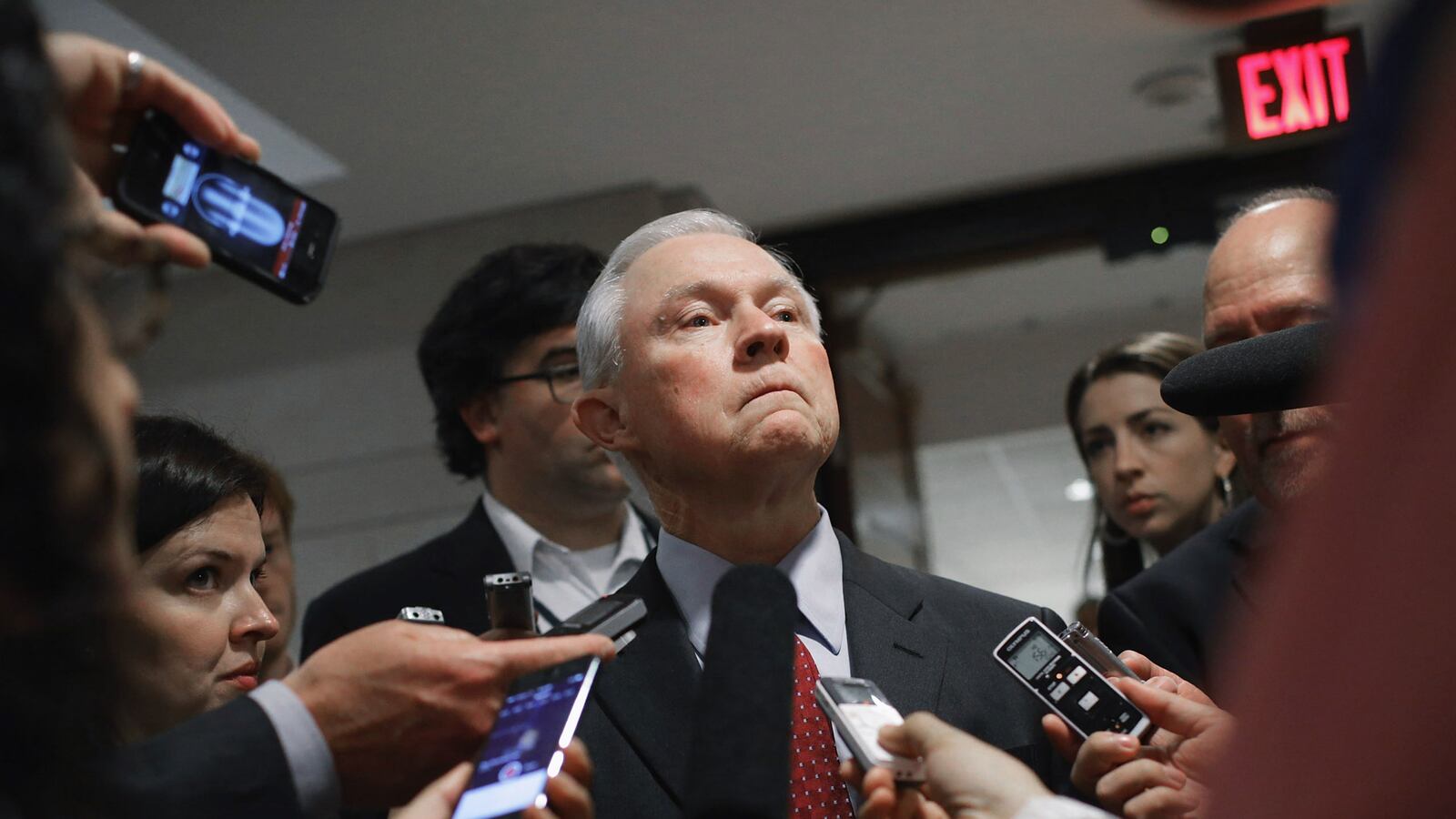The Senate confirmation hearing for President-elect Donald Trump’s controversial pick for Attorney General, Alabama Senator Jeff Sessions, is less than a week away. There remains much that the American public and even his fellow senators need to know about Trump’s nominee.
Thus far Sessions has quietly waged a corrupt campaign of obfuscating and whitewashing his own troubling record, which includes a failed Senate confirmation hearing in 1986 to be a U.S. District Judge for the Southern District of Alabama.
This year, Sessions returned his Senate Judiciary questionnaire with many questions left unanswered. Yet still Judiciary Committee Chair Charles Grassley approved his questionnaire, and on that very same day, Dec. 9, Grassley confirmed that Sessions’s confirmation hearing would take place 32 days later. In comparison, it took 104 days from submitted questionnaire to confirmation hearing for current Attorney General Loretta Lynch. Additionally, it is incredibly unorthodox to hold Senate confirmation hearings for a president-elect’s nominee while the sitting president is still in office.
In response to Sessions’s incomplete questionnaire, civil rights groups demanded answers, and on Dec. 23, Sessions submitted a more complete response. From this trove of data, civil rights grouped determined that pertinent information from 20 years of his record still remained omitted. The Alliance for Justice has compiled a 43-page document detailing the significant omissions (PDF).
Sessions and the GOP have shown a complete disregard for the democratic processes that form the bedrock of our government and ensure that qualified individuals represent the American people and defend our laws.
The American public and Senate Democrats should have many questions to ask Sessions — since he seems more inclined to hide information. Here are seven that I believe are essential.
1. Why did you think it was appropriate to return an incomplete questionnaire, and furthermore why have you still chosen to omit 20 years’ worth of pertinent information that includes your stints as a U.S. Attorney for the Southern District of Alabama from 1981-1993, Attorney General of Alabama from 1995-1997, and even your first five years as a U.S. Senator from Alabama (1997-2002)?
The lack of oversight of Sessions’s confirmation process thus far speaks to an institutionalized level of corruption and cronyism in which government officials are more interested in giving lofty promotions to their unqualified friends than they are with the well-being of the American people. Sessions has shown a complete disregard for the procedure and significance of this nomination process.
Not surprisingly, much of the information that Sessions omitted consists of issues that ruined his 1986 hearing: namely, the looming suspicion that Sessions is a racist. Witnesses at the time testified that Sessions had referred to the NAACP and Southern Christian Leadership Conference as “un-American” because they attempted to “force civil liberties down the throats of people,” and that he stated that he had a problem with the Ku Klux Klan only after he found out that some of them smoked marijuana.
2. Do you still believe that the NAACP and Southern Christian Leadership Conference are “un-American” and work to “force civil rights down the throats of people”? And if you disavow these statements, could you explain why these are institutions are not “un-American” in your current view?
3. Apart from their possible use of marijuana, can you explain why you find the Ku Klux Klan and similar white nationalist and/or supremacy groups to be problematic and would you describe these hate groups as “un-American”?
Additionally, in 1986, Sessions was accused of agreeing that white lawyers who defend black clients were “traitors to their race,” regularly referring to his black assistant as “boy.” He did not entirely refute either of these accusations. So he should also be asked:
4. Do you still believe that white attorneys who defend black clients are race traitors?
5. Did you refer to Thomas Figures, who was your black assistant when you were a U.S. Attorney in Mobile, Ala as “boy”? And do you recall ever referring to other African American males as “boy”?
In 1986, the Senate did not explicitly label Sessions as a racist, but in the eyes of many senators, these controversies made him unfit to be a federal judge. Yet not surprisingly Sessions’s disqualifications at the federal level made him a perfect fit for defending Alabama’s constitution.
Alabama’s current constitution was created in 1901 after the fall of Reconstruction with the intention of circumventing federal law, ignoring the 13th, 14th, and 15th amendments to the Constitution, reestablishing white supremacy in the state, and oppressing African Americans. Poll taxes, literacy exams and Jim Crow were the byproducts of this constitution. African Americans along with poor whites, women and other minorities have been electorally and economically displaced ever since as a result of this constitution. So, a sixth question:
6. Do you believe that Alabama should create a new constitution founded on the principles of racial equality instead of racial division and inequality? And if you currently do or have ever approved of Alabama’s existing constitution, do you feel that your apparent tolerance of legally ratified injustice and inequality as you’ve represented Alabama makes you ill-equipped to be Attorney General of a diverse democracy that promotes racial equity?
Additionally, Sessions’s main engagement with civil rights has been to level spurious claims of voter fraud against African Americans in Alabama. One case in particular seriously derailed his 1986 hearing. And recently, he also condoned the closure of DMV offices in Alabama’s Black Belt that issued voter IDs during this presidential election. The Department of Transportation has found that these closures disproportionately harmed black voters. Hence, another question:
7. During all of your years in government how many successful cases of voter fraud have you prosecuted or overseen, and do you believe that your efforts have done more to encourage or discourage voter participation?
There are many more questions that Sessions should be asked, but these speak to his character and fitness to represent the American people. His nomination process has been a disgrace. He still has not addressed the concerns that torpedoed his 1986 nomination, and he displays a greater willingness to support and sustain institutions that perpetuate racial and economic inequality and injustice instead of defending the civil rights of the American people. At every pass, Sessions has shown that he is unqualified to be Attorney General, and now he needs to be asked the tough questions.






